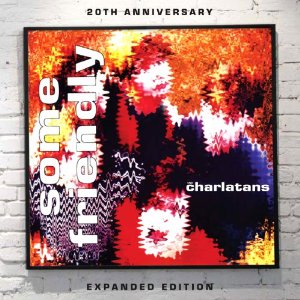It might seem absurd now, given that, twenty years on, they’re still a going, if not overly chart-bothering, concern, but there was a time when there was actually something enormously charlatanic indeed about the Burgess brigade. Like many of their peers, they were introduced to the wider world via the wonders of ITV’s still-lamented The Chart Show, but, unlike everyone else, they sparked off all manner of classroom discussions around the did-you-see nature of a band who not only combined the vocal stylings of the Roses with the whirry wilfulness of the Inspirals but also had a frontman who – as an NME front cover featuring them both would make explicit back in 1993 – was the very image of Mark Gardener. Clearly, their debut should by rights be both the most 1990 record in the world… ever! and the single most cynical artefact of the baggy age.
Of course, as it turns out, the former epithet can be scientifically proven to apply instead to Deee-Lite’s ‘World Clique’, while the latter would end up being Blur’s Leisure (a record that, for all its clutch of fine moments, feels very much like an endeavour to squash every Melody Maker Single Of The Week circa the year that preceded it onto just the one LP), and, instead, _Some Friendly’ _as ended up as an object of sufficient love that it bought the Charlies a free pass for years before their reputation for doggedness and general commercial consistency truly set in. Curiously, though, and almost in spite of its title, it’s hardly the most amiable endeavour of its age: opener ‘You’re Not Very Well’ is pointed and far from steady on its feet, while ‘Then’ must surely be one of the most foreboding top twenty singles of the entire decade, Rob Collins’ Hammond heroics summoning up the most enigmatic of vortexes while Burgess delivers a vocal whose weird opacity sits at calculated odds with the dismissive vitriol of the lyrics.
Indeed, returning to it now, it’s curious – not to mention something of a testament to the volatility of the age that spawned it – to think that this was a number one album in its day. Its reclamation of psychedelic elements from the unloved wayside in which they had resided through the 80s (something it does so successfully that the lovely, not to say lengthy languor of ‘Opportunity’, with its wide open space and wandering bass, remains a fuzzy avatar of wistful summeriness even now) would, under other circumstances, have rendered them strictly a critics’ band; the exact fate, of course, that befell Shack some years earlier and later. Plus, their instincts for both mod and modernism would actually allow them to presage Britpop rather better than many of their contemporaries, and would produce tracks that had the courage to be genuinely, well, groovy – ‘White Shirt’ and ‘Sonic’ have a vibrancy and cavalier chomp to them that’s let them age far better than many more specifically stylised songs, and it’s hard not to feel that, for all the highlights that would follow, this may well still be where the quintet were at their most unapologetically unaffected.
Moreover, it doesn’t exactly hurt that they were also writing what remain some of the finest songs of their career. Those early comparisons meant that they’d be looking at a finale worthy of ‘I Am The Resurrection’, ‘Sackville’ and ‘Vapour Trail’, and ‘Sproston Green”s an impressive tilt at those standards, woven into ever more hypnotic whirls by Blunt and Collins’ startling keys and bass double-punch and stellarly stretched guitar from a seldom-better Jon Baker, while ‘Polar Bear’, always a favourite, is still the album’s moment of purest joy, its giddy shadowboxing ensuring that it soars above a fascinatingly provincial lyric. And, thanks to the bonus disc now included, we’re even treated to ‘The Only One I Know’, somewhat overplayed at the time, perhaps, and even something of a millstone for several years, but nevertheless a golden pop moment, albeit one steeped in pretty much every facet of countercultural 60s you’d care to mention.
You might argue, of course, that there’s no need to have it show up twice (since it reappears as part of a strikingly stripped-down Mark Goodier session from which ‘Indian Rope’ in particular comes out very well if a shade shambolic) and, to be honest, few of the extras here are wholly essential from anything other than a historical viewpoint. These exceptions are ‘Imperial 109’ and ‘Opportunity Three’, which are intriguingly evolved takes on their original-disc counterparts, with Baker’s blissful playing on the former proving almost a memorable revelation, while ‘Over Rising’ and ‘Taurus Moaner’ give early indications of a certain restlessness that would take a little while to reliably coalesce. Yes, they’d ultimately be more idiosyncratic (‘Up To Our Hips’, one of the decade’s forgotten gems) and imperial (the mighty ‘Tellin’ Stories’, of course) than this, but revisiting ‘Some Friendly’ turns out to be the best evidence that, whether anyone realised it at the time or not, the Charlatans were thoroughly versed in being enduring, and endearing, from the off.



